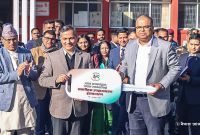Deadly vaccine denials in Pakistan: A major crisis in Khyber-Pakhtunkhwa

In Pakistan’s Khyber-Pakhtunkhwa (K-P) province, vaccine denial has taken a tragic toll, with at least 78 children losing their lives to vaccine-preventable diseases in recent years.
These deaths starkly highlight the devastating consequences of misinformation and hesitancy surrounding immunisation.
One of Pakistan's leading dailies, The Express Tribune, wrote in its recent editorial, citing official data, that 65 percent of measles fatalities and 90 percent of diphtheria cases occurred among unvaccinated children, underlining the heightened vulnerability of children who are deprived of life-saving vaccines.
The unfolding crisis in K-P demands urgent attention to combat the rising tide of vaccine refusal and its catastrophic repercussions.
The deaths of these 78 children serve as a grim reminder of the effectiveness of vaccines and the peril of forgoing them.
Measles and diphtheria, once largely controlled by vaccination programs, are resurging with deadly consequences.
These diseases are hazardous for young children, who can suffer from severe complications such as encephalitis, respiratory failure, and even death.
The data from K-P reveals troubling patterns. Measles accounted for a significant number of fatalities, with 65 percent of these deaths occurring among unvaccinated children.
Similarly, diphtheria cases showed a staggering 90 percent prevalence among those who had not received the vaccine.
These statistics paint a stark picture of the risks associated with vaccine denial and emphasise the critical role of immunization in safeguarding public health.
Several factors contribute to vaccine hesitancy in K-P:
Misinformation and myths: Rampant misinformation about vaccines has fueled scepticism and fear among parents.
False beliefs that vaccines cause infertility, contain harmful substances or are part of a foreign conspiracy have gained traction, particularly in rural areas.
Social media platforms and local misinformation campaigns have amplified these unfounded claims, creating widespread apprehension.
Cultural and religious influences: Cultural norms and religious beliefs also play a significant role in vaccine denial.
Some communities perceive vaccination as incompatible with their traditions or religious practices.
Religious leaders who oppose vaccination further reinforce these perceptions, discouraging parents from immunizing their children.
Lack of awareness and education: A lack of awareness about the importance of vaccines and their role in preventing diseases contributes to hesitancy.
Many parents in K-P are unaware of the severe consequences of vaccine-preventable diseases, leading them to underestimate the risks of avoiding immunization.
Accessibility challenges: In some cases, logistical challenges such as poor healthcare infrastructure, a shortage of vaccines, and limited access to vaccination centres exacerbate the problem.
Families in remote areas often struggle to reach healthcare facilities, making it difficult to vaccinate their children.
The loss of 78 young lives in K-P represents not only a public health crisis but also an immense human tragedy.
Families are left grieving for children whose deaths could have been prevented through simple, cost-effective measures.
Beyond the immediate loss, the broader community suffers as outbreaks of diseases like measles and diphtheria strain healthcare resources and hinder socio-economic development.
Outbreaks also pose a risk to vaccinated individuals, particularly those with compromised immune systems who rely on herd immunity for protection.
When vaccination coverage drops, herd immunity weakens, creating opportunities for diseases to spread.
This dynamic further underscores the importance of high vaccination rates to protect entire communities.
To address the vaccine hesitancy crisis in K-P, a multi-faceted approach is needed.
Governments, healthcare organizations, and community leaders must collaborate to implement effective interventions:
Public awareness campaigns: Targeted awareness campaigns are crucial to dispel myths and educate communities about the benefits of vaccination. These campaigns should leverage local languages, culturally appropriate messaging, and trusted community figures to foster trust and understanding.
Engaging religious leaders: Involving religious leaders in vaccination efforts can help counter resistance rooted in religious beliefs. By educating these leaders about the importance of immunisation, they can become advocates for vaccines within their communities, promoting acceptance and compliance.
Strengthening healthcare infrastructure: Improving healthcare accessibility in remote areas is essential. This includes ensuring the availability of vaccines, deploying mobile vaccination teams, and investing in healthcare facilities to make immunization more convenient for families.
Combating misinformation: Efforts to counter misinformation must be proactive and robust.
Governments and NGOs can collaborate with social media platforms to monitor and address false information about vaccines. Promoting accurate, evidence-based information can help shift public perceptions and rebuild trust.
Incentivizing vaccination: Providing incentives for vaccination, such as financial benefits or school enrolment requirements, can encourage hesitant parents to immunize their children.
These measures have proven effective in other regions and can be tailored to the local context in K-P.
The vaccine hesitancy crisis in K-P is not just a local issue; it has global implications.
International organizations such as UNICEF and the World Health Organization (WHO) play a critical role in supporting vaccination efforts in Pakistan. Their involvement includes providing technical assistance, funding immunisation programmes, and advocating for vaccine equity.
Additionally, international collaboration is essential to address cross-border health challenges.
Diseases like measles and diphtheria do not respect borders, and outbreaks in one region can quickly spread to neighbouring areas.
Strengthening global health partnerships is key to preventing the resurgence of vaccine-preventable diseases.
The deaths of 78 children in Khyber-Pakhtunkhwa are a tragic reminder of the deadly consequences of vaccine denial.
These preventable losses highlight the urgent need for action to address vaccine hesitancy and ensure that every child has access to life-saving immunisations.
By prioritising education, combating misinformation, and strengthening healthcare infrastructure, stakeholders can work together to build a future where vaccine-preventable diseases no longer claim innocent lives.
The responsibility lies with governments, healthcare providers, community leaders, and individuals to champion immunisation and protect the health and well-being of children across Pakistan.





![From Kathmandu to the World: How Excel Students Are Winning Big [Admission Open]](https://nepalaaja.com/img/70194/medium/excel-college-info-eng-nep-2342.jpg)


